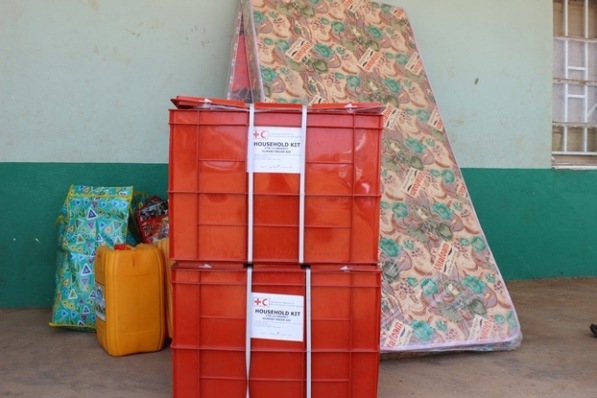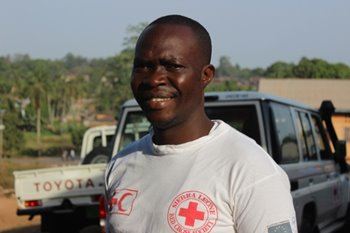Guest post by Lisa Pattison, IFRC
Without a doubt, stepping over the threshold to leave an Ebola treatment centre for the last time gives a patient a certain degree of euphoria; against many odds they have survived this highly contagious and deadly disease. However, the grim reality of day-to-day survival looms ahead as many have lost the breadwinner of the family, or their entire family, and their possessions have been destroyed, burned or disinfected with chlorine solution to avoid the further spread of the disease.
.jpg.aspx;.pdf;)
A psychosocial assistant volunteer visits a household under quarantine during the Ebola epidemic Photo credit: Lisa Pattison/IFRC
To facilitate the reintegration of survivors back into their communities, the Sierra Leone Red Cross Society is providing 2,000 survivor kits to all patients being discharged from Ebola treatment centres across the country. Individuals hosting Ebola orphans are also receiving these kits to help alleviate extra financial pressure they face of having to care for an additional person. The survivor kits contain mattresses, clothes, food, money, personal hygiene goods, household items and condoms.

The kits contain mattresses, clothing, household items and food to help survivors restart their lives. Photo credit: Lisa Pattison/IFRC
N’mah Sesay received a kit after being discharged from an Ebola treatment centre in Port Loko. Nine people within her compound were Ebola positive after having come into contact with an individual who fled quarantine in a neighbouring village and sought refuge with them. Although N’mah’s family ordered the individual to return to his village, they became infected with the virus. Three have survived but the fate of the others is unknown. All of the nine patients lost their possessions in the decontamination process.
“I am the happiest person in the world now to have been given these items. All my possessions were burned,” says N’mach Sesy upon receiving her kit. “These things will be very useful in the future.”
 The discharge kits serve as an economic buffer for survivors while they regain their physical strength and come to terms with the psychological aspect of having battled through one of the world’s deadliest diseases. “The kits let survivors restart their lives because many have lost family members and their possessions. They are often lost, so this help from the Red Cross is really appreciated,” says Cherner B. Kamara, a Red Cross psychosocial support volunteer, pictured right (photo courtesy Lisa Pattison/IFRC).
The discharge kits serve as an economic buffer for survivors while they regain their physical strength and come to terms with the psychological aspect of having battled through one of the world’s deadliest diseases. “The kits let survivors restart their lives because many have lost family members and their possessions. They are often lost, so this help from the Red Cross is really appreciated,” says Cherner B. Kamara, a Red Cross psychosocial support volunteer, pictured right (photo courtesy Lisa Pattison/IFRC).
Before the patient is discharged, psychosocial volunteers go to the community to prepare for the survivor’s return by explaining that they are cured and are no longer infectious. These visits allow the community to raise any concerns which helps decrease their fear and has been shown to result in the acceptance of returning patients. The psychosocial volunteers will then continue to visit the survivor once they are back home, to make sure they are reintegrating well and to address any stigmatization they may be facing.
N’mah has been positively accepted by her community and hopes she will soon see the return of the others whose fate still remains unknown.
Read more Ebola survivor stories and learn how the generous support of Canadians and the government of Canada is having an impact in the fight against Ebola.

